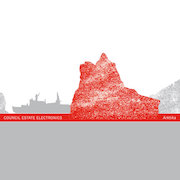Ever since his teenage years when he sailed from the power electronics of his first solo project (Final) and through the birth of grindcore as part of Napalm Death, Justin Broadrick has navigated genres as if on a conquest to cross the ocean of sound. In each harbour he drops anchor the waters are left that bit more polluted as deposits of Birmingham-born industrial effluence are left in his wake. With every contaminated style comes its own moniker – Godflesh for Broadrick’s take on US noise rock, Techno Animal for experiments in electronica and hip-hop with Kevin Martin, or Jesu to signpost alt-rock songs in a My Bloody Valentine mode to name but a few.
Broadrick’s latest nom de plume, Council Estate Electronics, is a collaboration with Jesu’s bassist Diarmuid Dalton and their third album, Arktika, forms the second instalment in the Italian label Glacial Movements’ ‘Iceberg Series’. It follows Netherworld’s Zastrugi, whose deep frozen techno serves the series’ analogy well. But, while the weight and scale of the bass frequencies throughout Arktika certainly suit the class of Russian icebreaker it takes its name from, the environment Broadrick and Diarmuid’s music evokes is far from the icy seas off Siberia, and instead remain much closer to the regions bestowed on their previous instalments.
Council Estate Electronics initially set about jamming with "synths, tapes and FX" to collide kosmische and industrial influences. Their debut, 2009’s Kitsland, its name taken from a road in the Shard End area of East Birmingham where they both lived and met in 1984, provides a moody soundtrack to the monolithic tower block of its cover. It was followed up in 2012 by longmeadow, named after another locality from their formative stomping grounds, its two long-form pieces invoking the grimy synthwork of Throbbing Gristle, who, themselves, sounded like they were drawing upon Kluster’s bleaker experiments in Berlin of the late sixties, early seventies.
But, as if to confound expectations, here the duo drops the industrial malevolence that haunted the previous two albums and instead blend heady synth sunrises with deep bass manoeuvres over dub riddims. The heat it exudes and the urban lifestyle it suggests couldn’t be further from the icy expanse of the Arctic Ocean. Indeed, throughout Arktika‘s eight tracks it is as if a colossal stylus has descended to earth and landed in Birmingham, the planet’s rotation enabling it to pick up the street-level vibrations as it travels through the groove formed by the roads that connect the city’s condensed, built up residential areas and rows of dilapidated factories.
Like many of Broadrick’s albums, the first track is the most definitive. ‘Urals’ lays down a path of evenly spaced kick drums bound tightly to a single-note bassline, never straying from the sequencer’s grid. But the sinuous dance of several synths and delicious dub-inflected dashes of hi-hat and snare breathe life into this straightest of metres.
From here on, while the mood can certainly get more menacing on tracks like ‘567 foot 33,500 ton’ and ‘Rosatom’ with stealthy, swooping tones invading the steady sub-bass throb, Broadrick and Dalton largely stick to the same plan. Similar to Basic Channel’s minimal productions of the mid-Nineties that got bracketed as dub techno, it is a simple formula that Arktika does nothing to hide, but it doesn’t need to. While all this genrefication may seem contrived on paper, in the experienced hands of Broadrick and Dalton Arktika’s tracks are forged and laid with maximum impact: each individual event feels so well-crafted (in the way the best Boards Of Canada tracks manage to pull off), that it simply seduces you to follow in, and not fight, its natty urban stroll.


